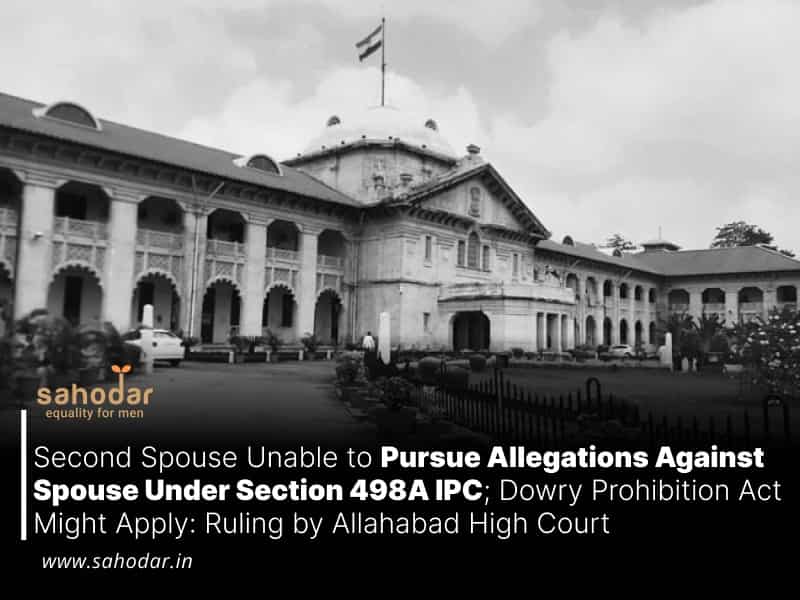The Allahabad High Court has ruled that a ‘second wife’ cannot file a complaint under Section 498-A of the IPC (pertaining to cruelty) against her husband. Nevertheless, if there is a demand for dowry in such situations, the Dowry Prohibition Act of 1961 may be applicable.
“…for the dowry, the performance of marriage is not necessary, and even a marriage contract is sufficient. If a male and female contracted for marriage and cohabiting together and the male partner makes any dowry demand from the female partner, then ingredients of Sections 3 and 4 of the D.P. Act are attracted,” ruled a bench of Justice Arun Kumar Singh Deshwal.
The Court made this determination while considering a petition filed by the husband and his family members challenging the entirety of the proceedings, including the filing of charges and the issuance of summonses, related to a case involving Sections 498-A, 323, 504, 506, and Sections 3/4 of the Dowry Prohibition Act.
In their argument before the High Court, the applicants asserted that the proceedings initiated against them were unlawful. They contended that the complainant, who claimed to be the wife of the first applicant, lacked legal validity as the first applicant, the husband, had not obtained a divorce from his first wife. Consequently, they argued that prosecuting the husband under Section 498-A IPC and Sections 3/4 of the Dowry Prohibition Act at the behest of such a ‘second wife’ (the complainant) was not sustainable.
Conversely, the State’s counsel argued that a strict interpretation regarding the validity of marriage should not be applied for Section 498-A IPC and Sections 3/
4 of the Dowry Prohibition Act. They suggested that liberal consideration should be given to individuals who enter into marriage and live together.
Observations of the High Court
In considering these arguments and examining the case’s facts, the Court initially observed that to establish the elements of Section 498-A of the Indian Penal Code (IPC), a woman must suffer cruelty at the hands of her ‘husband’ or his relatives.
Furthermore, the Court noted that under Section 5 of the Hindu Marriage Act, for a marriage to be deemed valid, neither party should have a living spouse at the time of marriage.
Therefore, if the first spouse is alive, a subsequent marriage is not recognized as valid. Consequently, the Court concluded that a ‘second wife’ in such a scenario cannot file a complaint under Section 498-A IPC since the marriage is considered null and void in the eyes of the law.
In reaching this conclusion, the Court referred to the Supreme Court’s ruling in the case of Shivcharan Lal Verma And Anr. vs State Of Madhya Pradesh. The Supreme Court held that if a marriage itself is null and void, then prosecuting the husband under Section 498-A IPC at the insistence of the alleged wife is not sustainable.
“The relationship between such a man and woman cannot be as husband and wife. Therefore, proceeding under Section 498-A I.P.C. is not maintainable against such a husband at the instance of a second wife (not legally wedded),” the Court further ruled as it held that a second wife cannot maintain a complaint against her Husband.
Regarding the offense under Section 3/4 of the Dowry Prohibition Act, the Court highlighted that these sections entail the act of giving, taking, or demanding dowry by any individual. According to Section 2 of the Act, dowry may be exchanged before, during, or after the marriage ceremony.
Furthermore, the Court emphasized that the actual performance of the marriage ceremony is not a prerequisite for the exchange of dowry; even a marriage agreement alone is adequate.
Building upon this observation, the Court acknowledged that in the present case, the appellants and the opposing party no. 2 had been cohabiting as husband and wife, resulting in the birth of three children. Therefore, despite the invalidity of their marriage, the accusation of dowry demand or acceptance by the applicants would satisfy the criteria of Section 3/4 of the Dowry Prohibition Act.
Consequently, while dismissing the proceedings under Section 498-A IPC, the Court upheld the proceedings under Section 323, 504, 506 IPC, and Section 3/4 of the Dowry Prohibition Act, partially granting the plea.

